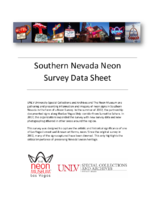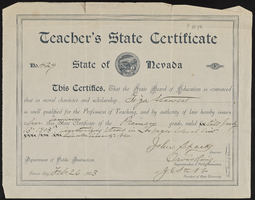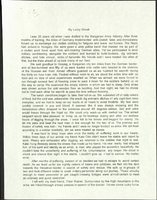Search the Special Collections and Archives Portal
Search Results

Neonopolis Neon Survey document, September 8, 2017
Date
Archival Collection
Description
Site address: 450 Fremont St
Sign owner: Rohit Joshi leases the building from Wirrulla USA Inc.
Sign details: This building was originally constructed in 2001 as a retail store center. This location currently holds a Denny's, a vintage toy store, the Telemundo station office and an international food market. This location also held a movie theater until 2009.
Sign condition: 4.5- Sign still in relatively new looking condition
Sign form: Entrance sign
Sign-specific description: Above the main entrance way into the mall there are the letter "NEONOPOLIS" in plastic back lit signs. Each letter has a lime green border with white strip and then purple for the main color of the block letters. The letter "O" in "polis" is actually an orbit shape that is orange and purple to double as the "O". Portions of the building have neon tubes, some illuminating blue and others are purple, green, red and yellow. There are also different colored shapes of neon spread throughout the building such as yellow triangle as well as orbits showcasing red and yellow neon tubing. Many of the companies in this location have their own signs as well.
Sign - type of display: Plastic back lit sign and neon
Sign - media: Plastic and steel
Sign - non-neon treatments: Plastic back lit portion
Sign environment: This property is on Fremont in between 4th St. and Las Vegas Blvd. Right in front on the building is the Slotzilla machine where people get onto the zipline.
Sign - date of installation: 2002
Sign - date of redesign/move: When the movie theater portion of this location closed in 2009 part of the signage was taken down and in recent years with different companies settling in there have added their own signs.
Sign - thematic influences: The name and the theme of this location being neonopolis showcases the downtown neon vibe particularly since there is a wide variety of neon display surrounding this property.
Sign - artistic significance: Showcasing the different designs with neon shows how true of an art it still is, particularly with the triangle designs and the orbits
Survey - research locations: Asessors page, https://neonjoshiassociate.wixsite.com/mysite-1 Neonopolis website, https://www.reviewjournal.com/entertainment/food/neonopolis-theaters-to-go-dark-thursday-night/ Review Journal article discussing the closure of their movie theater, https://lasvegassun.com/news/2002/may/03/long-awaited-neonopolis-opens-in-downtown-vegas/ Las Vegas Sun article talking about their opening in 2002
Survey - research notes: There used to be an 18 theater movie theater located there which shut down in 2009 and was renovated into clubs, the most recent one to open is called the Nerd.
Surveyor: Emily Fellmer
Survey - date completed: 2017-09-08
Sign keywords: Plastic; Backlit; Neon; Steel; Fascia
Text
DeRionne P. Pollard (Nevada State University) oral history interview conducted by Magdalena Martinez and Taylor Cummings: transcript
Date
Archival Collection
Description
From the Lincy Institute "Perspectives from the COVID-19 Pandemic" Oral History Project (MS-01178) -- Education sector interviews file.
Text

Stewart family legal papers and certificates
Date
Archival Collection
Description
Stewart family legal papers and certificates
Text
Red Rock Canyon National Conservation Area Records
Identifier
Abstract
The Red Rock Canyon National Conservation records (1965-2007) contain information about the Red Rock Canyon National Conservation Area (previously the Red Rock Canyon Recreation Lands). It largely consists of newspaper clippings on a variety of events related to Red Rock Canyon from 1965 to 1998 with the bulk from the 1980s and 1990s. The records also include Bureau of Land Management documents pertaining to interpretive efforts, visitation statistics, and law enforcement reports. Also included are the newsletters (1990-1998) and volunteer training manual of the Friends of Red Rock Canyon, a non-profit volunteer organization.
Archival Collection

Transcript of interview with Laura & Don Garvin by Michael Martocci, March 3, 1979
Date
Archival Collection
Description
On March 3, 1979, Michael Martocci interviewed Laura (born in California) and Don Garvin (born in Goldfield, Nevada) about their lives in Las Vegas, Nevada. The two provide details on their family background, the first sources of water in Las Vegas, and the early city limits. They also describe their early occupations, religion, gambling, the Mormon Fort, and the effects of the Great Depression. The interview concludes with a brief discussion on the development of the Las Vegas Strip and recreational activities.
Text
Dunes Hotel Photograph Collection
Identifier
Abstract
The Dunes Hotel Photographs (1950-1993) consist of administrative, publicity and entertainment images documenting the history of the Dunes Hotel and Casino in Las Vegas, Nevada. In addition to materials focusing on day-to-day activities at the hotel (correspondence, contracts, personnel, budgets, etc.) the collection provides insight into the hotel’s entertainment and public relations activities. Although there are chronological gaps in the collection, particularly during the later years of the Dunes (1970s-1990s), it provides a significant amount of historical documentation on the famed Strip hotel that was long known to tourists and residents alike as the “the Miracle in the Desert.”
Archival Collection
Dunes Hotel and Casino Records
Identifier
Abstract
The Dunes Hotel and Casino Records are comprised of administrative, publicity, and entertainment materials documenting the history of the Dunes Hotel and Casino in Las Vegas, Nevada from the years 1954 to 1992. Included are correspondence, contracts, photographs, hotel budgets, and an early aerial photograph of the property. The material provides a significant amount of historical documentation of the hotel that was long known to tourists and residents as the "the Miracle in the Desert."
Archival Collection
Fort Mojave Indian School Records
Identifier
Abstract
The Fort Mojave Indian School Records (1890-1923) consist of correspondence, finance and administrative records, pump station blueprints, and policy implementation and fact finding records. The school served the Hualapai and Mojave Indians at a site near present-day Kingman, Arizona. The information is contained in two bound volumes.
Archival Collection


